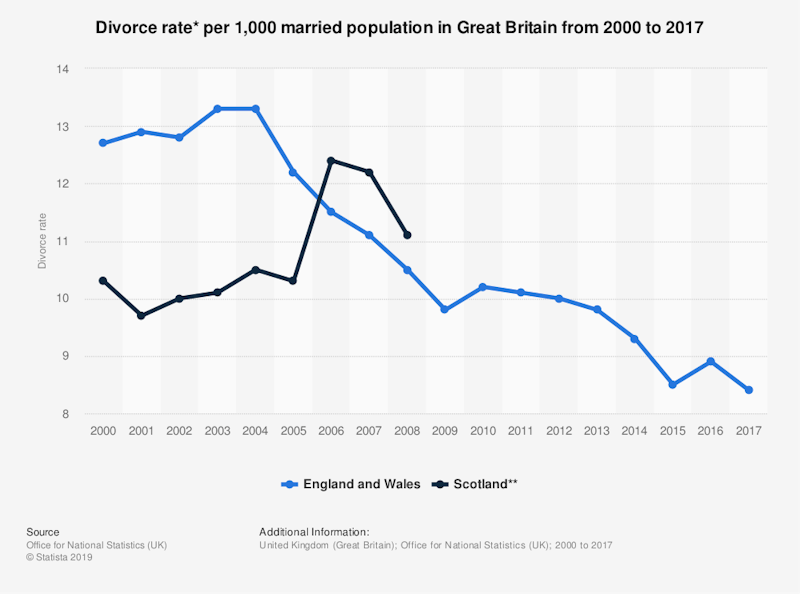In the News
Economics of the falling divorce rate

5th December 2019
Economic theory has a lot to say about marriage and divorce.

An important piece of social news emerged last week. According to the Office for National Statistics (ONS), the divorce rate in 2018 fell to its lowest level for nearly fifty years.
The overall trend is clear and well-established. The divorce rate rose steadily from the late 1950s, with sharp rises immediately following the Divorce Act of 1969, to the early 1990s. Since then, with minor blips, the rate has fallen. It now stands at just over half the level of its 1993 peak.
Economic theory has a lot to say about marriage and divorce.
This may be surprising to many. But economics believes that its basic model, that of someone making a rational choice from the alternatives on offer in any given situation, is universal in its application. The institution of marriage is a key social phenomenon, and so the rational choice model ought to be able to give an explanation as to why it exists.
The Chicago economist Gary Becker received the Nobel prize in 1992 for his pioneering work in this area. Essentially, the participants in a marriage reap what economists see as the gains from trade. One partner goes to work and earns money, and the other raises children and does housework. By each concentrating on the activity which he or she does better than the other, both parties benefit.
Implicitly, Becker took as the social background to his theory the institutional structure of marriage and the family as it existed in the Midwest of the USA in the 1950s. Gender roles have certainly evolved since then, but his basic insights remain valid.
A much more general theory of marriage is linked with the work of economists such as Bob Rowthorn, former head of the Cambridge economics department.
In this approach, marriage is seen as an institution for providing couples with the confidence to make long-term investments in their relationship. The basic theme is that marriage should be seen as an institution for creating trust between individuals in the sphere of family life.
Given this emphasis on both trust and the long term, it is curious that many metropolitan liberals, not least Lady Hale when she headed the family courts, appear to see marriage as no better than any other form of family structure.
The empirical evidence overwhelmingly supports the special value of marriage for the individuals concerned, for their children and for society. Indeed, there are few hypotheses in the social sciences which receive such clear confirmation from serious research.
For example, most children grow up to be useful and well-adjusted members of society regardless of family structure. But the incidence of crime and mental illness amongst children whose parents have divorced, whilst low as a proportion of all such children, is much higher than it is amongst those whose parents remain married.
The falls in the divorce rate can be seen as rational learning by the generation who were children themselves when divorce was at its peak. They see the costs impose on them. And society as a whole will reap the benefits in years to come.
You might also like

Defaults today mean less jam tomorrow
25th July 2013

Why crime is falling
1st April 2015

Economic theory and the death of a lion
8th August 2015

Unlikely Events - Lessons for Economists from Art and Sport
11th April 2016

The Architecture of Choice
9th July 2016
Behavioural Economics Revision Quizzes
Quizzes & Activities

Predatory Universities and A Level Grades
24th August 2017

After Corona - What might be the new normal?
26th March 2020